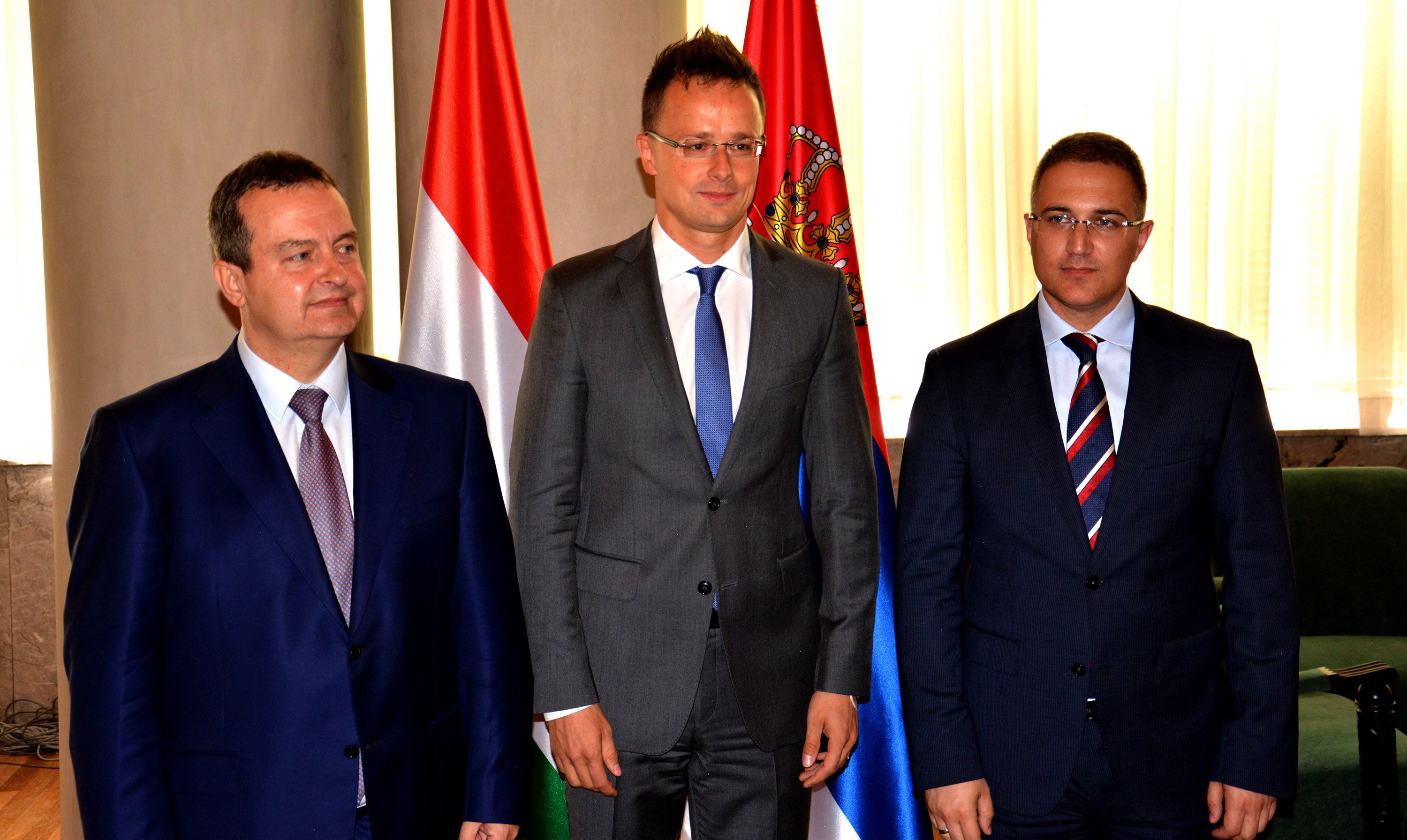




|
|
| Ministers Dacic, Stefanovic and Siarto discussed - in Belgrade, today - the migrant crisis |
| + larger fontnormal font- Smaller font |
 First Deputy Prime Minister and Minister of Foreign Affairs of the Republic of Serbia Ivica Dacic and Minister of Interior Nebojsa Stefanovic met today with Foreign Minister of Hungary Peter Siarto. First Deputy Prime Minister and Minister of Foreign Affairs of the Republic of Serbia Ivica Dacic and Minister of Interior Nebojsa Stefanovic met today with Foreign Minister of Hungary Peter Siarto.The Ministers assessed at a press conference following the meeting that relations between the two countries were excellent and should not be impaired by the migrant crisis. Ministers Dacic and Siarto recalled the statements made by their Prime Ministers at the previous joint meeting between the two Governments, held in Budapest, on 1 July 2015, that the bilateral relations between the countries had never been better, adding that considerable efforts had been made to bring about substantive progress in addressing the issues of the past. They indicated that there was not a problem between the two countries, but that the European policy concerning the migrant crisis proved unsuccessful, due to the absence of a common position. “It is essential that all these conflicts, including the assault by irregular migrants on the Hungarian police, throwing of tear gas, injury of the RTS crew, are not the result of relations between Serbia and Hungary”, stated Minister Dacic, indicating that, after these conflicts, the first specific step that should be taken by the Hungarian authorities is to consider the possibility of opening the Horgos border-crossing to traffic. “For the above reasons, we believe that in crisis situations – and this is a crisis situation although the EU may not wish to say it that – and the crisis of irregular migrations is one of the major crisis that affected Europe since WWII, Serbia has found itself in a delicate position between two prongs of the EU. If Hungary complains of arrival of migrants from the south, among other directions, we can complain of irregular migrants coming directly from the EU”, Minister Dacic said. According to Minister Dacic, this means that the European policy has failed on this issue, because there is not a common position. He underlined that there was no common European policy regarding the situation which has been created, as a result of which Serbia has found itself on this route with no fault of its own. “Serbia cannot afford to be the victim of the absence of a common EU policy, though it has made an effort to act with dignity and be fair to migrants and states in the neighbouring area”, underlined Serbian Foreign Minister. Minister Dacic added that Serbia requested and appealed for normalization of the situation and opening of the motorway at Horgos, underlining that he was absolutely against the closing of these lines of communication, and that the same problem existed with Croatia, as well. Hungarian Foreign Minister explained that he deemed it important to come to Belgrade today, in order to convey the position of Hungary that the relations between the two countries are excellent, and cannot be gravely affected by current challenges that are extremely difficult and serious. “I think there is much hypocrisy in Europe today. Europe is not honest when referring to the magnitude of the challenge that we are facing. Those who are defining the problem and referring to it for what it actually is, which is what Hungary is doing, are the subject of continued condemnation. This is not only a migrant crisis, it is a massive movement of people, which cannot end within a short period of time”, Minister Siarto indicated. Hungarian Foreign Minister went on to say that Hungary had proposals for resolving the crisis. The first among these proposals is to establish joint forces that would protect the external borders of the EU in Greece, and that all 28 EU Member States should participate in providing staff and equipment. Furthermore, the EU should undertake the funding of reception centres in Turkey, Lebanon and Jordan, and establish additional ones in order that migrants remain in close proximity to their homelands, the financing of which should be shared among all EU Member States. According to Hungary’s proposal, the EU should also assist transit countries for migrants, like Serbia and Macedonia. “I understand my colleagues saying that they do not understand what the EU expects from Serbia, when the migration influx is coming from the EU. This poses a problem for Hungary too, because migrants should be registered in the first country they enter, which is Greece”, he stated. Minister Stefanovic stated that he had talks with the European Commissioner for Migration and that they agreed that all transit countries should be provided specific assistance in money and equipment. He added that Serbia had registered some 85 per cent of migrants who entered its territory, indicating that 150,000 persons were registered, and that this data has been shared with European institutions. “Problems come and go, just like migrants, whereas neighbours remain”, underlined Stefanovic, stressing that this was not a bilateral problem and that this should not be allowed to harm the relations between the two countries. |